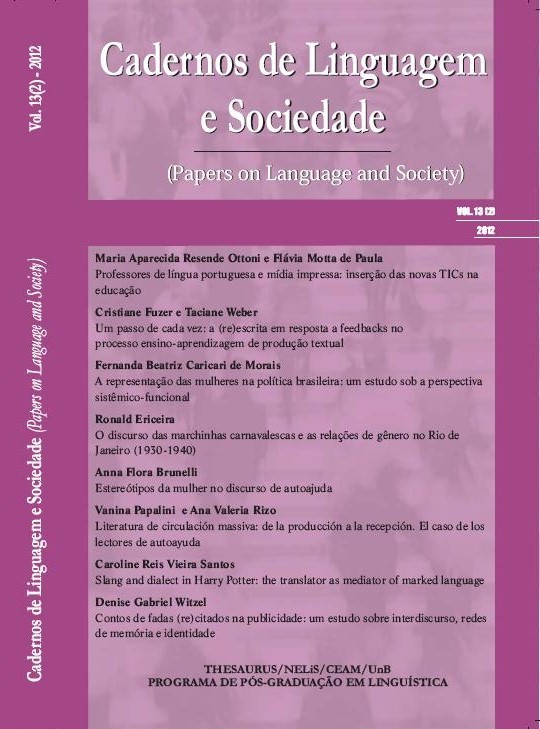SLANG AND DIALECT IN HARRY POTTER: THE TRANSLATOR AS MEDIATOR OF MARKED LANGUAGE
DOI :
https://doi.org/10.26512/les.v13i2.21665Mots-clés :
Children’s Literature. Descriptive Translation Studies. CorpusBased Translation Studies. Translator as Mediator. Slang. Dialect.Résumé
The present research covers the intersection between Descriptive Translation Studies and Children’s Literature and aims to investigate the important role of the translator as mediator of marked language, more specifically by dialect and slang. This paper is based both on Santos’s (2010) concluded mastering thesis which investigated the translation of the dialect of the character Rubeus Hagrid and Santos’s ongoing PhD research which deals with translation into Brazilian Portuguese of slang words in the Harry Potter series. The initial hypothesis is that dialects and slang words will be translated by standard language and this translator choice is influenced by the particularities of its readership.
Téléchargements
Références
ALBIR, A. H.; MOLINA, L. Translation Techniques Revisited: A Dynamic and Functionalist Approach. Meta : journal des traducteurs / Meta: Translators’ Journal, v. 47, n. 4, p. 498-512, dezembro de 2002.
ALLEN. Diff Doc Profissional Demo. [S.l.]: SoftInterface, 1999.
AYTO, J.; SIMPSON, J. Oxford Dictionary of Modern Slang. 2a. ed. Oxford: Oxford University Press, 2008.
BAKER, M. Towards a methodology for investigating the style of literary translator. Target - International Journal of Translation Studies, v. 12, n. 2, p. 241-266, 2000.
BBC RADIO 4. J.K. Rowling and Stephen Fry Interview Transcript. Disponível em: <http://www.mugglenet.com/jkr/interviews/bbc4.shtml>. Acesso em: 10 abr. 2012.
Dicionário inFormal. Disponível em: <http://www.dicionarioinformal.com. br/>. Acesso em: 4 jan. 2012.
DON, H. Notepad ++. [S.l: s.n.], 2011.
DUBOIS, J. Dicionário de Linguística. 11. ed. São Paulo: Editora Cultrix, 2009.
EBLE, C. Slang and Sociability. Chapel Hill/London: The North Carolina University Presse, 1996.
FAWCET, P. Translation and Language. Manchester: St Jerome, 1997.
FERNANDES, L. P.; BARTHOLAMEI JR., L. A. Portuguese-English Parallel Corpus. Disponível em: .
FERREIRA, A. B. DE H. Miniaurélio: o minidicionário da língua portuguesa. 7a. ed. Curitiba: Editora Positivo, 2008. CD-ROM
GURGEL, J. B. S. E. Dicionário de gíria : modismo linguístico; O equipamento falado do brasileiro. Brasil: [s.n.], 2009.
HALLIDAY, M. A. K. Spoken and Written Language. 2. ed. Hong Kong: Oxford, 1989.
HATIM, B.; MANSON, I. Context in translation: register analysis. Discourse and the translator. London: Longman, 1990. p. 36-54.
IMAO, Y. Simple Web Parallel Concordancer. Casual Conc. [S.l: s.n.]. Disponível em: <http://sites.google.com/site/casualconc/web-parallelconcordancer>. Acesso em: 16 set. 2010. , 2008
JENTSCH, N. K. Harry Potter and the Tower of Babel: Translating the Magic. In: LATHEY, G. The Translation of Children’s Literature: A Reader. Topics in Translation. Clevedon: Multilingual Matters, 2006. p. 190-207.
KLINGBERG, G. Children’s Fiction in the Hands of Translators. Sweden: CWK Gleerup, 1986.
KRINGS, H. P. Translation Problems and Translation Strategies of Advanced German Learners of French. In: HOUSE, J.; SHOSHUANA, B.-K. (Eds.). Interlingual and Intercultural Communication. Narr: Tübingen, 1986. p. 263-
NEUFELDT, V. Informality in Language. Dictionaries: Journal of the Dictionary Society of North America, v. 20, n. 1, p. 1-22, 1999.
PRETI, D. Dicionários de Gíria. Alfa, n. 44, p. 57-73, 2000.
ROWLING, J. K. Harry Potter and the Philosopher’s Stone. London: Bloomsbury, 1997.
ROWLING, J. K. Harry Potter e a Câmara Secreta. Tradução Lia Wyler. Rio de Janeiro: Rocco, 2000.
RUDVIN, M.; ORLATI, F. Dual Redearship and Hidden Subtexts in Children’s Literature. Children’s Literature in Translation. Manchester: St Jerome, 2006. p. 157-184.
SANTOS, C. R. V. A tradução da fala do personagem Hagrid para o português brasileiro e português europeu no livro Harry Potter e a Pedra Filosofal: um estudo baseado em corpus. Florianópolis: Universidade Federal de Santa Catarina, 2010.
SHAVIT, Z. “Cheshire Puss,... Would you tell me, please, which way I ought to go from here?” Research of Children’s Literature ”“ The State of the art.
How did we get there ”“ how should we proceed. In: CENITAGOYA, A. I. L.; LEÓN, E. L. Y; VÁZQUEZ, J. S. F. (Eds.). Realismo Social y Mundos Imaginarios: Una Convivencia para el Siglo XXI. Madrid: Universidad de Alcalá, 2003.
XATARA, C. M.; FALCÃO, P. C. DE S. Os animais nos idiomatismos: interface inglês-português. Cadernos de Tradução, v. 2, n. 16, p. 71-82, 2005.
TRUDGILL, P. The Dialects of England. 2ª. ed. Massachusetts: Blackwell, 1999.
Téléchargements
Publié-e
Comment citer
Numéro
Rubrique
Licence
Autores/as que publicam nesta revista concordam com os seguintes termos:
Autores/as mantêm os direitos autorais e concedem à revista o direito de primeira publicação, sendo o trabalho simultaneamente licenciado sob a Creative Commons Attribution 4.0 International license que permite o compartilhamento do trabalho com reconhecimento da autoria do trabalho e publicação inicial nesta revista.



